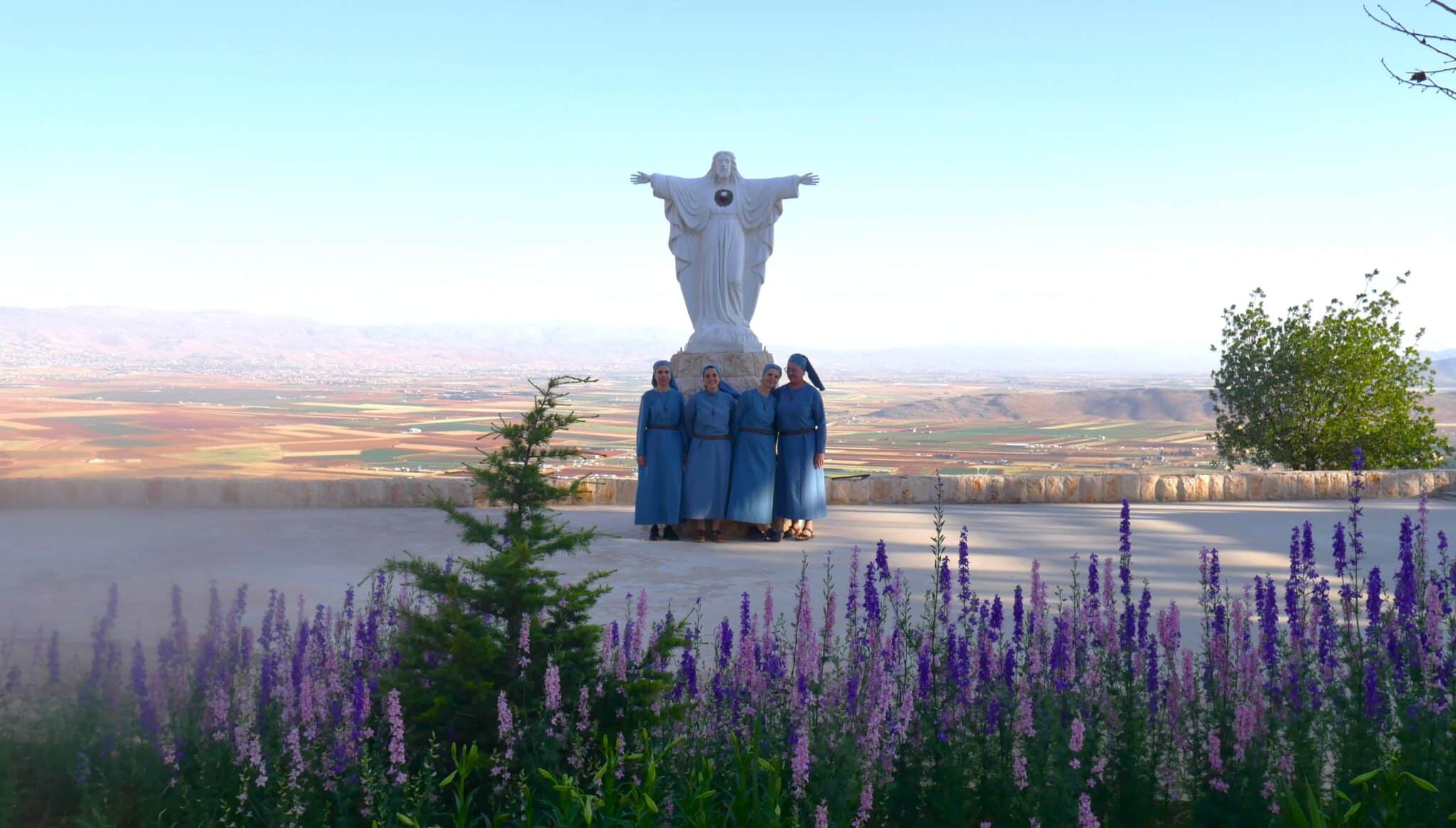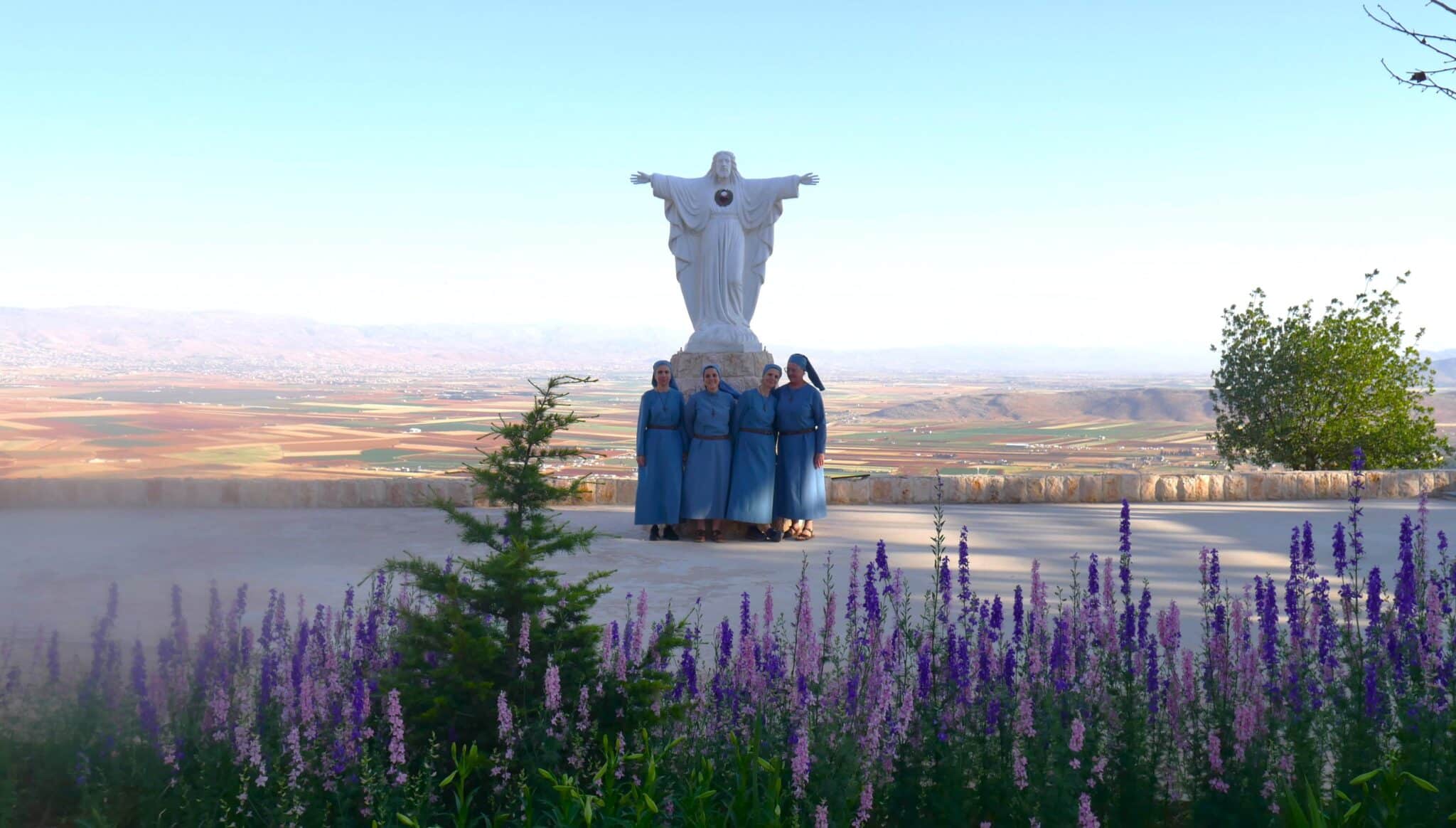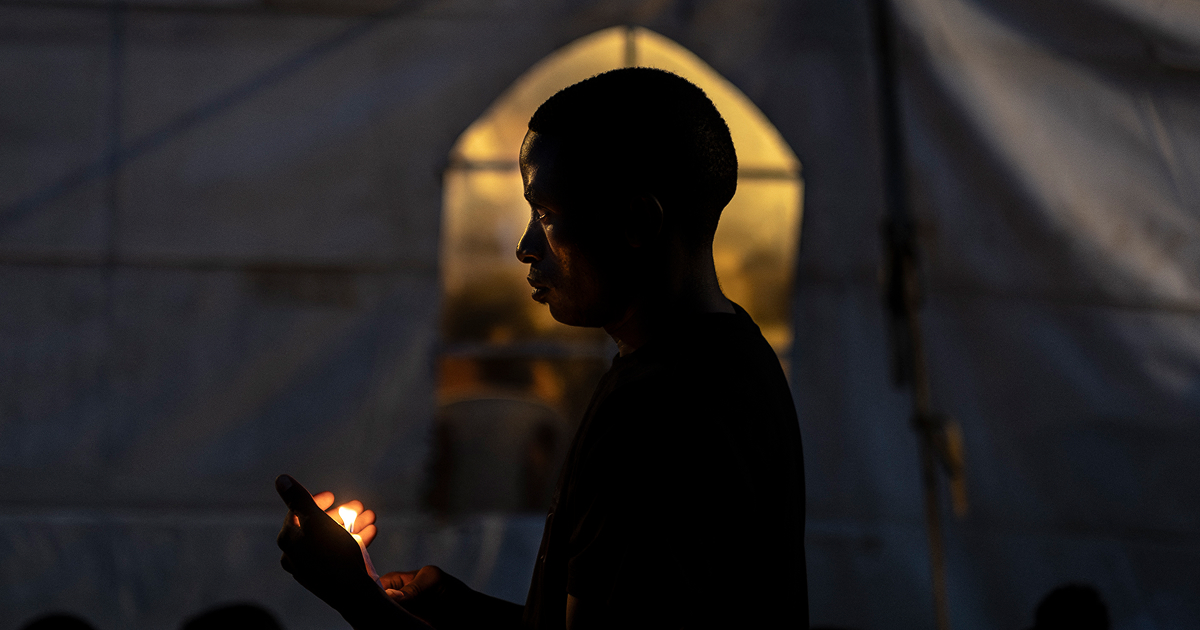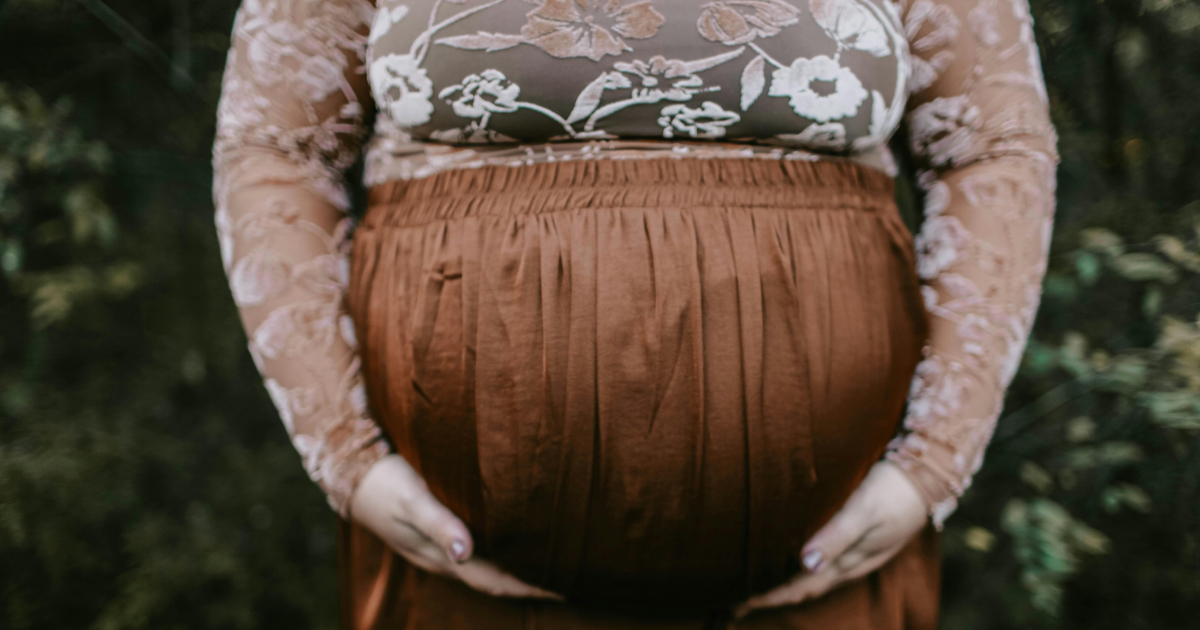When I recently visited Lebanon with Aid to the Church in Need (ACN), I expected to find a suffering Church. Instead, I encountered a vibrant Christian community full of faith, hope and love.
At the height of the latest war last autumn, one in four people in Lebanon was displaced. The Christian population has been caught in the crossfire of a conflict between Hezbollah and Israel in which they have nothing to gain, and everything to lose. Many of their homes have been turned to rubble, with churches damaged, agricultural land destroyed and livelihoods lost.
And yet, amid the material devastation and poverty, I found a Church that is alive – beating with a faith that refuses to be extinguished, despite decades of suffering, including a civil war. Again and again, I was reminded that God does not abandon those who trust in Him. As Maronite Bishop Hanna Rahmé of Baalbek-Deir El-Ahmar put it, Lebanon’s Christians have “a clear conscience” – and that, in itself, is a kind of victory.
Pope St John Paul II once wrote that “Lebanon is more than a country”. I understood what he meant while walking on the land sanctified by Our Lord’s footsteps. Lebanese Christians have a deep spiritual connection to their homeland, intertwined with a strong sense of heritage – as descendants of the Phoenician people – and of faith, creating a unique identity. Although more Lebanese now live abroad than in Lebanon itself, they never fail to preserve that identity.
Christians still comprise around a third of the population – more than of either the Sunni or Shia Muslim populations respectively – and retain significant political influence. According to the 1943 National Pact, the President and Army Commander must always be Maronite Christians. The Prime Minister is always Sunni Muslim, and the Speaker of Parliament a Shia Muslim.
The majority of Lebanese Christians belong to the Maronite Church, which has never broken communion with Rome in its 1,600-year history. Its liturgy preserves ancient Eucharistic prayers sung in Syro-Aramaic, enriching the universal Church by bridging East and West.
RELATED: Pope Leo XIV’s gentle criticism of contemporary western liturgy is a vital wake-up call
What struck me most was that even the poorest people gave thanks to God at every opportunity – often ending their sentences with a phrase of gratitude. One of them was Moussa, a Christian man whose home in South Lebanon was almost completely destroyed in an airstrike just months ago.
Moussa and his wife Michelin were not at home when the next-door house – reportedly used by Hezbollah to store weapons – was hit. They credited a 10-foot cross and St Charbel’s intercession with keeping their family safe. When they returned to their burnt-down home, they found only two items intact: pictures of St George and the Virgin Mary.
After they had to use all their life savings to rebuild, ACN provided emergency food aid to their family and others in similar situations to ease the burden.
Sister Maya El Beaino of the Congregation of the Sisters of the Sacred Hearts of Jesus and Mary had the choice to leave Ain Ebel in South Lebanon when airstrikes began last October. Locals were given just 40 minutes’ notice before bombardments commenced. Most fled. Sister Maya chose to stay.
Her congregation’s mission, she told me, is “to go to the peripheries and accompany those in need of help”. Their school is one of the highest-performing in Lebanon – 79 per cent of pupils had excellent grades, and six ranked among the top 10 in the country last year.
Sister Maya said that the school switched to online teaching during the war. She emphasised that, “when there was an airstrike near the home of one of the pupils, all of them could hear it”. Therefore, the children “had a sense that they were all in it together, even though they were physically apart”.
She added: “Many people have not returned even after it was safe. Only old people remained in the village at some point. They would rather die at home than move.” ACN helped her distribute essential medicines when local pharmacies were closed.
Nestled between mountain ranges north-east of Beirut, the Beqaa Valley – known as the breadbasket of Lebanon – was also heavily targeted in last autumn’s airstrikes. Hezbollah strongholds are located in Shia-majority areas, so Christian villages in this region generally remained unharmed.
Naddaf, a widow in her seventies, was one of many Christians who offered shelter to Shia families fleeing the devastation. She welcomed 12 people into her home, feeding them, clothing them and giving them a place to sleep for two months. A pregnant woman gave birth during that time, bringing the number of guests to 13.
Naddaf had no way of knowing who these people were – they could have been associated with Hezbollah, making her a target. When I asked if she had been afraid, she simply said: “I did what Christ asked me to do ... the courage came from the Virgin Mary.” It is always a blessing to meet people living the Gospel in such tangible ways.
In the Beqaa Valley we also visited a new Maronite monastic community, the Brothers of Beit Maroun, which has been growing steadily since its founding a decade ago. The 23 monks – most in their 20s and 30s – built their monastery with their own hands, with limited help from the Australian Maronite community, along with ACN supporting their formation.
Two of the monks are from Australia. Born in Sydney to Lebanese parents, they chose to return to their ancestral homeland. At a time when many young Lebanese are leaving, their story is a beacon of hope.
We also visited the Sisters of Jesus Abandoned, who teach in Catholic schools in predominantly Shia areas. Their dedication to education fosters mutual understanding and interfaith harmony. Indeed, many Lebanese Muslims prefer to send their children to Catholic schools because of their reputation for academic excellence.
At the orphanage in Jabboulé in the north, the Sisters of Our Lady of Good Help also embody Christian charity. During the war, they opened their convent to 850 displaced people, including Muslim families. Mother Joselyne Joumaa told me: “The price of love is high … but God is with us. Whom shall we fear?”
The Sisters’ care saved the life of a three-day-old baby found abandoned in Tripoli, 60 miles away. No local orphanages were able to take her in – but the Sisters made space.
This radical hospitality, this unwavering faith, is the powerful witness of the Lebanese Church. It reminds us what it means to love without counting the cost, and to believe, not because circumstances are favourable, but because we know God is faithful.
The Church in Lebanon may be surrounded by adversity, but it is not defined by it. In a land scarred by war and uncertainty, faith has been purified by fire. Where I expected to find only hardship, I met men and women who have chosen love over fear, sacrifice over comfort, and hope over despair.
RELATED: An encounter with the resilience and spirituality of Lebanon’s enigmatic Maronite Catholics
Photo: Sisters of the Forsaken Jesus, with the Beqaa Valley in the background (image by author).
When I recently visited Lebanon with Aid to the Church in Need (ACN), I expected to find a suffering Church. Instead, I encountered a vibrant Christian community full of faith, hope and love.
At the height of the latest war last autumn, one in four people in Lebanon was displaced. The Christian population has been caught in the crossfire of a conflict between Hezbollah and Israel in which they have nothing to gain, and everything to lose. Many of their homes have been turned to rubble, with churches damaged, agricultural land destroyed and livelihoods lost.
And yet, amid the material devastation and poverty, I found a Church that is alive – beating with a faith that refuses to be extinguished, despite decades of suffering, including a civil war. Again and again, I was reminded that God does not abandon those who trust in Him. As Maronite Bishop Hanna Rahmé of Baalbek-Deir El-Ahmar put it, Lebanon’s Christians have “a clear conscience” – and that, in itself, is a kind of victory.
Pope St John Paul II once wrote that “Lebanon is more than a country”. I understood what he meant while walking on the land sanctified by Our Lord’s footsteps. Lebanese Christians have a deep spiritual connection to their homeland, intertwined with a strong sense of heritage – as descendants of the Phoenician people – and of faith, creating a unique identity. Although more Lebanese now live abroad than in Lebanon itself, they never fail to preserve that identity.
Christians still comprise around a third of the population – more than of either the Sunni or Shia Muslim populations respectively – and retain significant political influence. According to the 1943 National Pact, the President and Army Commander must always be Maronite Christians. The Prime Minister is always Sunni Muslim, and the Speaker of Parliament a Shia Muslim.
The majority of Lebanese Christians belong to the Maronite Church, which has never broken communion with Rome in its 1,600-year history. Its liturgy preserves ancient Eucharistic prayers sung in Syro-Aramaic, enriching the universal Church by bridging East and West.
<a href="https://thecatholicherald.com/for-monday-why-pope-leo-xivs-gentle-criticism-of-contemporary-western-liturgy-is-a-vital-wakeup-call/"><mark style="background-color:rgba(0, 0, 0, 0)" class="has-inline-color has-vivid-cyan-blue-color"><strong><em>RELATED: Pope Leo XIV’s gentle criticism of contemporary western liturgy is a vital wake-up call</em></strong></mark></a>
What struck me most was that even the poorest people gave thanks to God at every opportunity – often ending their sentences with a phrase of gratitude. One of them was Moussa, a Christian man whose home in South Lebanon was almost completely destroyed in an airstrike just months ago.
Moussa and his wife Michelin were not at home when the next-door house – reportedly used by Hezbollah to store weapons – was hit. They credited a 10-foot cross and St Charbel’s intercession with keeping their family safe. When they returned to their burnt-down home, they found only two items intact: pictures of St George and the Virgin Mary.
After they had to use all their life savings to rebuild, ACN provided emergency food aid to their family and others in similar situations to ease the burden.
Sister Maya El Beaino of the Congregation of the Sisters of the Sacred Hearts of Jesus and Mary had the choice to leave Ain Ebel in South Lebanon when airstrikes began last October. Locals were given just 40 minutes’ notice before bombardments commenced. Most fled. Sister Maya chose to stay.
Her congregation’s mission, she told me, is “to go to the peripheries and accompany those in need of help”. Their school is one of the highest-performing in Lebanon – 79 per cent of pupils had excellent grades, and six ranked among the top 10 in the country last year.
Sister Maya said that the school switched to online teaching during the war. She emphasised that, “when there was an airstrike near the home of one of the pupils, all of them could hear it”. Therefore, the children “had a sense that they were all in it together, even though they were physically apart”.
She added: “Many people have not returned even after it was safe. Only old people remained in the village at some point. They would rather die at home than move.” ACN helped her distribute essential medicines when local pharmacies were closed.
Nestled between mountain ranges north-east of Beirut, the Beqaa Valley – known as the breadbasket of Lebanon – was also heavily targeted in last autumn’s airstrikes. Hezbollah strongholds are located in Shia-majority areas, so Christian villages in this region generally remained unharmed.
Naddaf, a widow in her seventies, was one of many Christians who offered shelter to Shia families fleeing the devastation. She welcomed 12 people into her home, feeding them, clothing them and giving them a place to sleep for two months. A pregnant woman gave birth during that time, bringing the number of guests to 13.
Naddaf had no way of knowing who these people were – they could have been associated with Hezbollah, making her a target. When I asked if she had been afraid, she simply said: “I did what Christ asked me to do ... the courage came from the Virgin Mary.” It is always a blessing to meet people living the Gospel in such tangible ways.
In the Beqaa Valley we also visited a new Maronite monastic community, the Brothers of Beit Maroun, which has been growing steadily since its founding a decade ago. The 23 monks – most in their 20s and 30s – built their monastery with their own hands, with limited help from the Australian Maronite community, along with ACN supporting their formation.
Two of the monks are from Australia. Born in Sydney to Lebanese parents, they chose to return to their ancestral homeland. At a time when many young Lebanese are leaving, their story is a beacon of hope.
We also visited the Sisters of Jesus Abandoned, who teach in Catholic schools in predominantly Shia areas. Their dedication to education fosters mutual understanding and interfaith harmony. Indeed, many Lebanese Muslims prefer to send their children to Catholic schools because of their reputation for academic excellence.
At the orphanage in Jabboulé in the north, the Sisters of Our Lady of Good Help also embody Christian charity. During the war, they opened their convent to 850 displaced people, including Muslim families. Mother Joselyne Joumaa told me: “The price of love is high … but God is with us. Whom shall we fear?”
The Sisters’ care saved the life of a three-day-old baby found abandoned in Tripoli, 60 miles away. No local orphanages were able to take her in – but the Sisters made space.
This radical hospitality, this unwavering faith, is the powerful witness of the Lebanese Church. It reminds us what it means to love without counting the cost, and to believe, not because circumstances are favourable, but because we know God is faithful.
The Church in Lebanon may be surrounded by adversity, but it is not defined by it. In a land scarred by war and uncertainty, faith has been purified by fire. Where I expected to find only hardship, I met men and women who have chosen love over fear, sacrifice over comfort, and hope over despair.
<a href="https://www.thecatholicherald.com/feature-an-encounter-with-most-reverend-abbot-mahfouz-and-the-resilience-and-enigmatic-spirituality-of-maronite-catholics/"><mark style="background-color:rgba(0, 0, 0, 0)" class="has-inline-color has-vivid-cyan-blue-color"><strong><em>RELATED: An encounter with the resilience and spirituality of Lebanon’s enigmatic Maronite Catholics</em></strong></mark></a>
<em>Photo: Sisters of the Forsaken Jesus, with the Beqaa Valley in the background (image by author).</em>


















